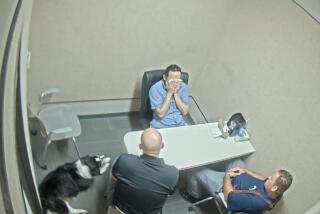Peyer Pulled Knott Off Road for Bad Light, Prosecutors Say
- Share via
San Diego State University student Cara Knott was killed by California Highway Patrol Officer Craig Peyer after he pulled the young woman off the freeway and took her to an isolated off-ramp, all because of a faulty license plate light, prosecutors allege in court documents filed late Monday.
This is the first time prosecutors have publicly stated the reason why they believe Peyer originally stopped Knott, described by friends and relatives as a cautious woman who was careful about keeping her family aware of her whereabouts.
She was so cautious she wouldn’t have driven to the darkened Mercy Road off-ramp from Interstate 15 unless she trusted the person who took her there, the documents filed in San Diego County Superior Court said.
“Based on the victim’s training, the only reasonable conclusion that can be reached is that she went there at the direction of a police officer, someone she would implicitly trust,” Deputy Dist. Atty. Jim Atkins said in the court papers.
Witness on Freeway
Ann Parascand, who was stranded on the off-ramp when a limousine that was transporting her and her boyfriend broke down, told homicide detectives that she saw a police cruiser leave the scene on the night of the killing at about the time that police said Knott was slain.
Prosecutors filed the 14-page argument in response to a motion by Peyer’s attorneys, who asked Superior Court Judge Richard Huffman to exclude the testimony of 19 young women who testified at Peyer’s preliminary hearing in April. The women said that Peyer forced each one to park at night on the off-ramp after stopping them for minor traffic violations, including faulty headlights, taillights and license plate lights.
Defense attorneys have asked that the women’s testimony be barred on grounds that it is irrelevant and that their testimony has nothing in common with Knott’s death.
Knott, 20, was strangled on Dec. 27, between 9 and 10 p.m., and her body thrown from the old U.S. 395 bridge, located under Interstate 15, 65 feet into a dry creek bed. Her body was discovered the next morning.
In the newly filed court documents, Atkins said the testimony of the 19 women is important because their experiences with Peyer show “a distinctive modus operandi common . . . to the charged crime.”
‘Similar Stops’
“The prior similar vehicle stops have some tendency to prove the material facts since they serve ‘logically, naturally, and by reasonable inference’ to establish the facts,” Atkins said. “ . . . The defendant was engaged in a highly distinctive course of conduct by luring young women who were in a safe place on the freeway to a very dark area of the Mercy Road off-ramp where there are no lights and is far away from traffic, all in violation of CHP policy.”
CHP Capt. Lee Denno, who testified at Peyer’s preliminary hearing, called the stops “unusual.” However, none of the women stopped by Peyer complained to his superiors and each said that Peyer never touched them or asked them out.
Peyer, who is free on $1-million bail that he raised with the assistance of friends and relatives, was fired in May.
Prosecutors summarized Knott’s killing in the following fashion:
“Although Cara Knott cannot tell us what happened, it takes no great imagination to visualize her driving alone southbound on Interstate 15, being pulled over by the defendant near the Mercy Road off-ramp for having an inoperable license plate light, receiving instructions from the defendant to take the off-ramp and drive to where her car was located, getting out of her car and confronting the defendant, attacking the defendant’s face when she believed he intended to harm her, and being strangled by the defendant in order to keep her from making allegations which would destroy his career and life.”
More to Read
Sign up for Essential California
The most important California stories and recommendations in your inbox every morning.
You may occasionally receive promotional content from the Los Angeles Times.













